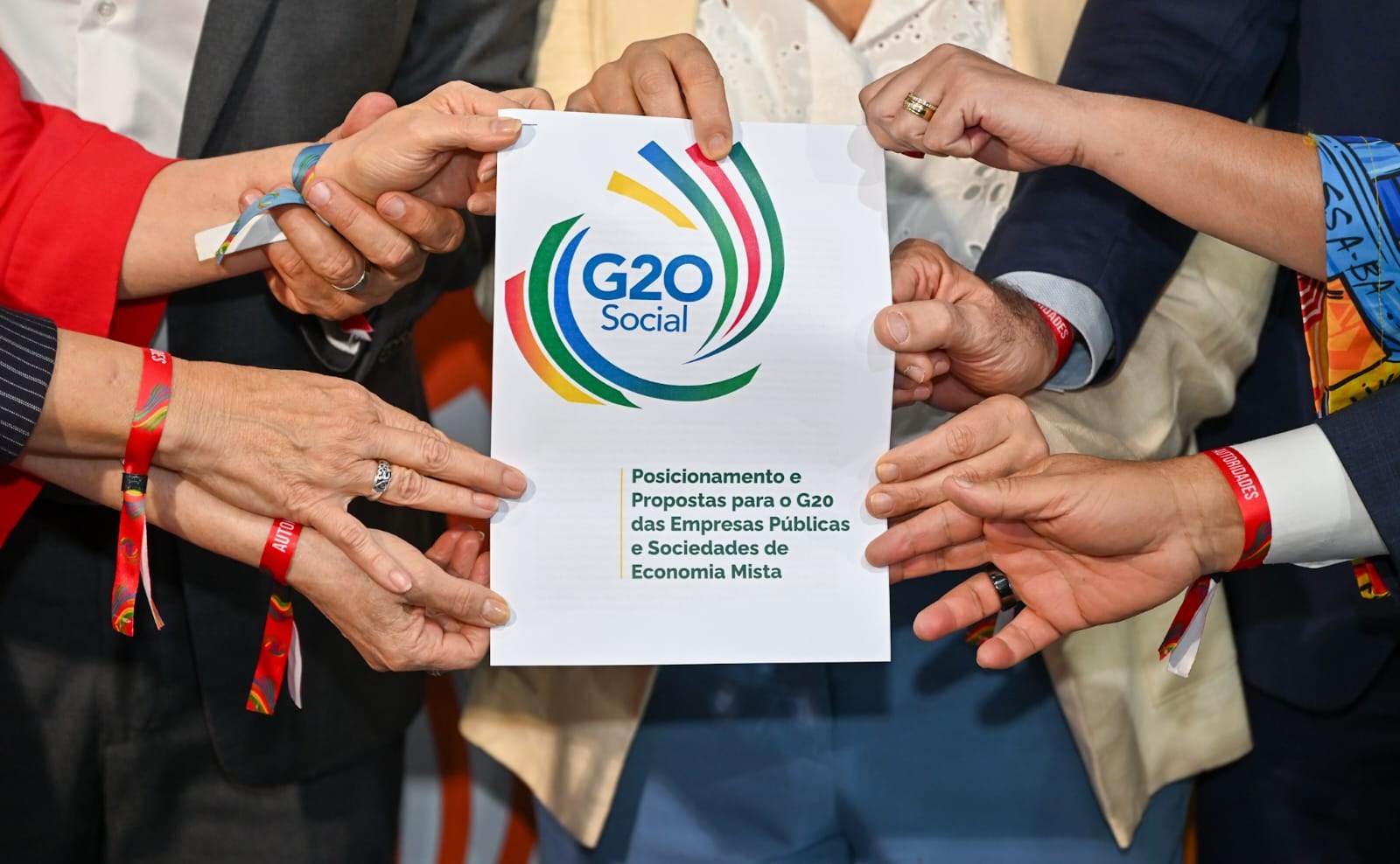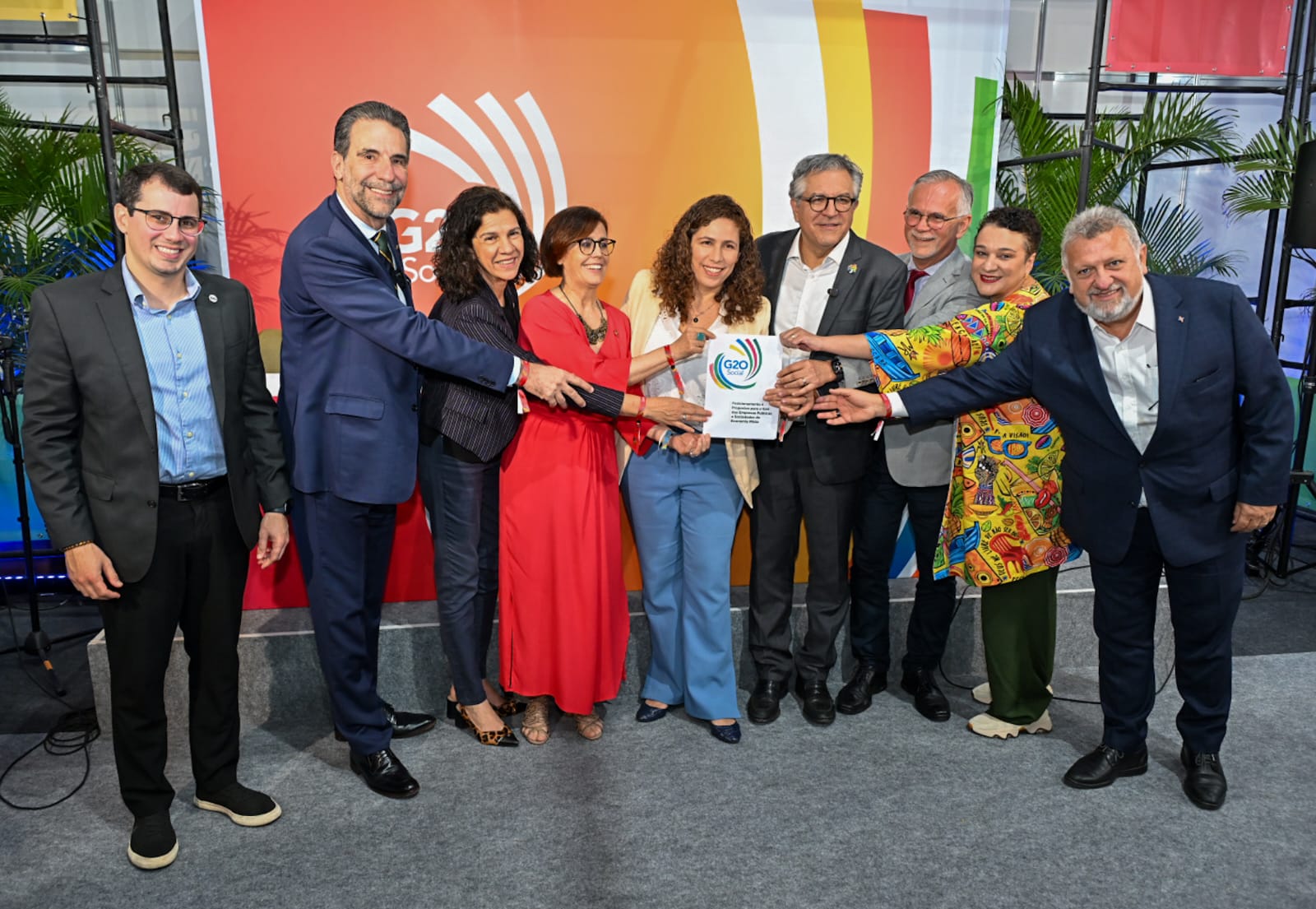At the G20 Social, five Brazilian state-owned companies present a letter with points to reduce inequality in Brasil
Itaipu Binacional, Banco do Brasil, Caixa Econômica Federal, BNDES, and Petrobras delivered a letter to Brazilian Minister Esther Dweck from Management and Innovation in Public Services.

On Friday (15), the Brazilian public companies delivered a letter to the Minister of Management and Innovation in Public Services, Esther Dweck, with proposals for the heads of state that are part of the G20. In the document, the companies present 32 contributions related to the energy transition, global governance reform, and the fight against poverty and hunger, among others.
“It is a great joy to receive these documents from large public companies, which are a source of pride for the Brazilian population. Some are centuries old, while others are newer, like Itaipu, which is in the record books for its cumulative electricity production. These companies are part of a country that may be one of the five largest economies in the world,” said the minister.
The content of the letter will be part of the G20 Social Declaration, which will be delivered to President Luiz Inácio Lula da Silva at the closing of the forum, parallel to the G20, on Saturday (16). The text was produced by Itaipu, Banco do Brasil, BNDES, Caixa Econômica, and Petrobras.
The Minister of State and Chief of the Secretariat for Institutional Relations of the Presidency of the Republic, Alexandre Padilha, highlighted each company's decisive and important role. “I thank the state-owned companies, as it would not be possible to achieve the main objectives proposed by the G20 leaders without recognizing their role in our country. We would not have cooperation mechanisms at the Brasil-Paraguay level without Itaipu, which is helping us to hold COP30,” recalled the minister.
The Director-General of Itaipu, Enio Verri, highlighted the role of state-owned companies in public policies and in the development of a more egalitarian and just sustainable state. “Brasil is a continental country with gigantic regional inequalities, and there is no better way to reduce these differences than to unite the efforts of state-owned companies for the application of public policies. And we have a commitment to that.”
The Executive Director of Corporate Affairs at Petrobras, Clarice Coppetti, emphasized Itaipu's participation in the group. “It is a company with a great team, bringing projects we were not aware of, but that are very important”.
Objectives of the document prepared by state-owned companies

The objective of the five leading companies of strategic sectors in Brasil is to contribute to effectively fulfilling the global sustainable development agenda. With a joint and coordinated action, the group wants to help promote a regenerative and equitable economy that positively impacts the Brazilian population, as well as the cities and production chains for a low-carbon economy. As a contribution, state-owned companies are committed to establishing partnerships and relationships with socially and environmentally responsible companies.
“We have a great commitment, which is the agenda that the president proposed to the global alliance focused on the energy transition. There is no better way to reaffirm this work than with organized movements. We have this commitment as public companies and banks,” stated Maria Fernanda, Director of Digital Credit for MSMEs at BNDES.
The document also reaffirms the joint goal of positively impacting Brazilian society, contributing, within the limits of its actions, to the expansion of the population's access to public policies and to overcome poverty and inequalities. The importance of knowledge exchange between countries facing similar challenges and sharing the same geographical and climate reality is also reinforced in the letter, as are discussions for climate justice and the diversity of peoples.
The president of Caixa Econômica Federal, Carlos Vieira, emphasized the importance of standing alongside other entities, demonstrating the strength of the union of these institutions “as public companies that contribute to mitigating the social problems Brasil has faced for centuries.”
The G20 events, including the G20 Social and Global Alliance - Festival Against Hunger and Poverty, are initiatives of the Brazilian Government and are coordinated by the Organization of Ibero-American States for Education, Science and Culture (OEI).
“We cannot belittle ourselves. It's up to us to position ourselves as one of the countries feeding a billion people on the planet. It makes no sense to have Brazilian people going hungry. Our joint mission is to combat inequality, prevent further climate change, and ensure a just transition and global governance reform,” said Tarciana Medeiros, president of Banco do Brasil.
Other authorities present at the event included Jorge Santana, the executive coordinator of the G20 Social, Rodrigo Rossi, the director of the Organization of Ibero-American States (OEI), and others.
*Translated by PGET-UFSC